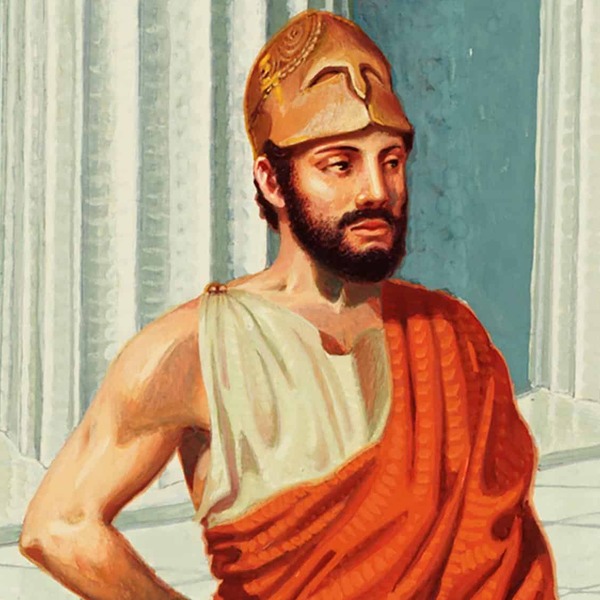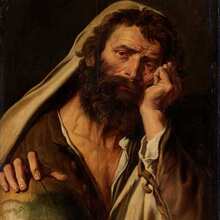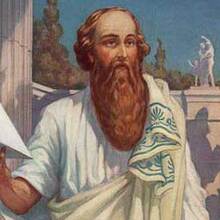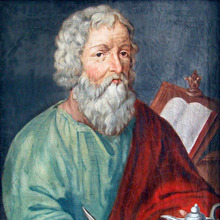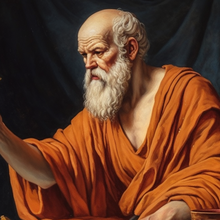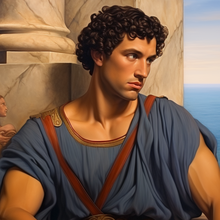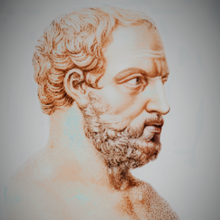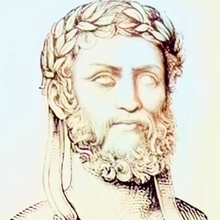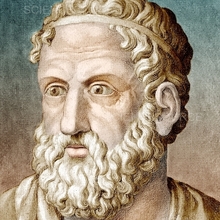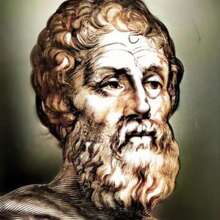Pericles was a Greek statesman, orator, general, and patron of the arts who led Athens in the 5th century BCE, a period known as the Golden Age or the Age of Pericles. He came from a wealthy and influential family of aristocrats and promoted democracy, culture, and empire in Athens. He initiated the construction of the Acropolis and the Parthenon, two iconic monuments of ancient Greece. He also fought in several wars, such as the Persian War, the Delian League, the Samian War, and the Peloponnesian War, which eventually led to his death from the plague in 429 BCE. His life and legacy were recorded by historians like Thucydides and Plutarch, who admired and criticized him in different ways.
Pericles was born around 495 BCE in Athens, Greece. His father was Xanthippus, a politician and general who had fought against the Persians at the Battle of Mycale. His mother was Agariste, a member of the powerful and controversial Alcmaeonid family, which had a history of involvement in tyranny and reform. Pericles was educated by some of the best teachers of his time, such as Anaxagoras, Zeno, and Protagoras. He also learned music and poetry from Damon and Pythocleides. He was influenced by the philosophy of Ionian rationalism and the art of Ionic architecture. ⁴
Pericles began his political career in the 460s BCE, when he became a leader of the democratic faction in Athens. He opposed the conservative aristocrats led by Cimon, who favored a friendly alliance with Sparta and a moderate expansion of Athenian power. Pericles advocated for a more radical democracy, a stronger naval empire, and a cultural revolution. He was elected strategos (general) for the first time in 461 BCE and held this office almost continuously until his death. He also dominated the popular assembly (ekklesia) with his eloquence and charisma. He introduced reforms that increased the participation and representation of the common people in the government, such as paying salaries to public officials, jurors, and soldiers; creating new courts and magistrates; expanding citizenship rights; and supporting colonization and immigration. ⁴
Pericles also transformed Athens into a cultural center of Greece. He sponsored public works that beautified and fortified the city, such as building walls, temples, theaters, statues, and fountains. His most famous project was the construction of the Acropolis, which included the Parthenon, a temple dedicated to Athena, the patron goddess of Athens. The Acropolis was designed by architects like Ictinus and Callicrates and decorated by sculptors like Phidias and painters like Polygnotus. It was a symbol of Athenian pride, piety, and power. Pericles also fostered the development of literature, philosophy, drama, music, and art in Athens. He patronized writers like Aeschylus, Sophocles, Euripides, Aristophanes, Herodotus, Thucydides, and Plato; philosophers like Anaxagoras, Socrates, Protagoras,
and Zeno; musicians like Damon and Pythocleides; artists like Phidias,
Polygnotus,and Zeuxis;and many others.He encouraged free speech,critical thinking,and artistic expression.He also organized festivals
and competitions that showcased Athenian culture,such as
the Panathenaia,the Dionysia,and
the Olympic Games.⁴
Pericles also led Athens in several wars that shaped the history of Greece. He fought against the Persians in the second Persian War (480-479 BCE) and helped form the Delian League, an alliance of Greek city-states that aimed to liberate the Aegean islands and Asia Minor from Persian rule. He also fought against the Spartans and their allies in the Peloponnesian War (431-404 BCE), a conflict that arose from the rivalry between Athens and Sparta, the two most powerful states in Greece. Pericles pursued a defensive strategy, relying on the superior Athenian navy and the protection of the Long Walls that connected Athens to its port of Piraeus. He also tried to maintain the loyalty and tribute of the Athenian allies, who resented the imperialistic policies of Athens. He faced several challenges and setbacks, such as the revolt of Samos (440-439 BCE), the outbreak of the plague (430-427 BCE), which killed a third of the Athenian population, including Pericles himself, and the defection of several allies, such as Megara, Lesbos, and Boeotia. ⁴
Pericles died in 429 BCE, after suffering from a fever for several weeks. He was mourned by his friends, family, and admirers, who considered him the greatest leader of Athens. He was survived by his partner Aspasia, a Milesian courtesan who was his companion and adviser for many years, and his two sons, Paralus and Xanthippus, who also died from the plague. He was buried in a public tomb in the Kerameikos Cemetery, where he had delivered his famous funeral oration in honor of the fallen Athenians in 431 BCE. In his speech, he praised the virtues of democracy, freedom, justice, courage, and glory that defined Athenian identity and culture. He also urged his fellow citizens to continue the war against Sparta and to preserve their way of life. ⁴
Pericles was one of the most influential figures in ancient history. He shaped the political and cultural landscape of Athens and Greece for generations to come. He was admired by many as a visionary leader, a brilliant orator, a wise statesman, a generous patron, and a noble warrior. He was also criticized by some as a demagogue, a tyrant, a warmonger, a corrupt politician, and a decadent aristocrat. His legacy is still debated and celebrated today by historians, philosophers, artists, and politicians. He is regarded as one of the founders of Western civilization and one of the champions of democracy and humanism. ⁴
